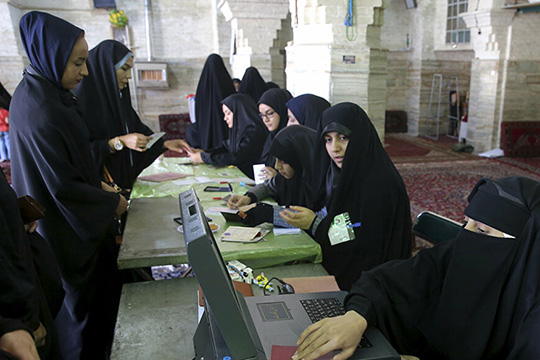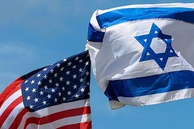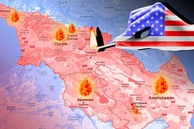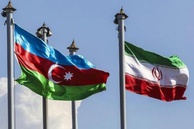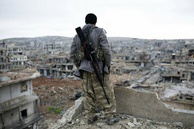Before analyzing the election outcome, it would be appropriate to say a few words about the peculiarities of the legislative power in the Islamic Republic of Iran.
The specifics of legislative power in Islamic Republic of Iran
The longest section of the Iranian Constitution – Chapter VI – is devoted to the legislative branch of government, represented by the Majlis.[2] In accordance with this chapter, the total number of parliamentary deputies is 290, of them 285 are elected by a general vote, one deputy is elected by the Zoroastrian and Jewish communities, two deputies are elected from the Armenian community and one representative is elected by the Assyrians and Christians.
Elections are held once every four years.
Under the current Constitution the parliament – Majlis – is authorized to initiate legislation in all spheres of human activity, to exercise control of the activities of top government officials (the president, ministers), including the appointment of ministers and hearings on their performance. Majlis has the right to carry out inquiries in any areas of public activity and is empowered to announce the impeachment of the president, demand that the president be removed from office, express a vote of no confidence in the government or some of its ministers. (The final decision rests with the Supreme Leader).
Parliamentary activity cannot run counter to the official state religion or the Constitution. Responsibility for ensuring that Majlis does not breach the Islamic principles or violate the Constitution lies with the Supervisory Board, or the Council for Monitoring the Observance of the Constitution [3].
This supra-parliamentary organ, the Supervisory Board, consists of 12 members, 6 of which (representatives of the Islamic clergy) are appointed by the Supreme Leader, and the other 6 (lawyers) are appointed by the Majlis.
The main function of the Supervisory Board is to make sure that the bills, laws and activities of officials comply with the Constitution. The Council approves Majlis decisions on candidates for key posts, including the president, deputies of the Majlis, members of Islamic councils and government ministers. It has the right to return any bill for finalization by the Majlis or veto any parliamentary decision, as well as to make amendments to the Constitution.
The Supervisory Board is empowered to monitor the elections of members of the Council of Experts (the main function of which is to elect the Supreme Leader), the president of the republic, the Majlis, as well as referendums and other forms of expression of public opinion. The SB has the right to reject candidates for the presidency, for the Majlis or the Council of Experts, as well as to abolish laws that run counter to the Constitution and Islamic principles.
The history of Iran knows instances of acute differences between the Supervisory Board and the Majlis which de facto blocked the adoption of major laws and forced the government to work in a legislative vacuum. In order to avoid such deadlocks, the Expediency Council was set up in 1988 to consider the appropriateness of the decisions taken and make the final decision in the event of disagreement between the Majlis and the SB. In later years, the powers of this Council were expanded to embrace supervision of the activities of the executive, legislative and judicial branches, the armed forces, etc.
Throughout the entire history of the IRI the Majlis has been the center of debates and the scene of open (or closed) political battles. Opposition representatives use the Majlis to voice their discontent with the policies of president or the government.
The role of the Iranian parliament becomes clear from the fact that in the past 40 years there wasn’t a government proposed by the newly elected president and fully and unanimously approved by the Majlis at first go. Under pressure from the Majlis the presidents had to replace ministers or have them as acting ones.
Of course, the Iranian Majlis does not play a major role in political decision-making. Important decisions are usually the result of informal negotiations within the political and clerical elite of the Islamic Republic of Iran in the presence of the Supreme Leader, in his office, or in the High Council of National Security.
Nevertheless, the Iranian parliament creates the appropriate decision-making atmosphere and lays the foundation of political activity in the country. The Majlis is able to assist the activities of the government or, conversely, impede or even obstruct the implementation of executive agenda.
The specifics of political landscape in IRI
The specific feature of the Iranian political landscape since the second half of the 1980s has been the formation of three ideological trends in Islamic political discourse which reflected the presence of differences within the establishment on a number of issues. These ideological trends, which can be identified as liberal-reformist, pragmatic and radically conservative, after surviving numerous transformations and changing some of their positions, still determine the development of political processes in Iran. Each of these wings have their own flanks, their own factions of the moderate, the centrists and the radicals, who are "waging battles" as well but within the framework of a single system of political values. Fairly often, representatives of these factions change their political coloring and join the ranks of their former opponents. For this reason, analysts signal the presence of only two political affiliations: the liberal - reformists and the radical conservatives. In all likelihood, this interpretation of the political scene in Iran makes sense, the more so since the presence, as said above, of moderate factions, the centrists and the radicals in these groups makes the political landscape in the country more complicated and at the same time more colorful.
For three decades, representatives of opposing factions alternately led the executive and legislative branches and tried to put their ideas into practice. At times, their rivalry escalated so much that it turned into a grave conflict which deteriorated to involve wider sections of the society but never to an extent when it could pose a threat to the stability of the regime. At the most critical times, the intervention of the Supreme Leader balanced the situation. It should be mentioned that the fierce political struggle between representatives of the opposing doctrines has been waged exclusively within the bounds of the Islamic regime, for its preservation, strengthening and prosperity (and, of course, for power). The differences can only be found in the tactics.
The Iranian Nuclear Program (INP) has become a major factor in the country's foreign and domestic policy since the exposure of its secret aspects in 2003. The INP triggered the anti-Iranian resolutions of the UN Security Council in 2006-2010, as well as the introduction of international and unilateral sanctions against Iran, which led to a profound economic crisis of 2012-2015.
On the other hand, the INP led reformist liberals who insisted on "nuclear talks" into Iran’s power structures. In 2013, a liberal (by Iranian standards), Hassan Rouhani, assumed the presidency, formed a government of his supporters, brilliantly held talks with permanent members of the UN Security Council, Germany and the European Union, in 2015 concluded a most important nuclear deal - the Joint Comprehensive Plan of Action (JCPOA) , which led to the lifting of anti-Iranian sanctions. The spectacular victory of Rouhani became the foundation of his policy, opening broad prospects for the development of Iran, for its participation in international cooperation.
However, the radical groups opposed to Hassan Rouhani, first of all, the Islamic Revolutionary Guard Corps (IRGC), used their presence in the Majlis, as well as the Institute of Islamic Councils, primarily the Supervisory Board, to thwart Rouhani’s attempts to carry out at least limited reforms. Meanwhile, corruption and poor management (including of financial and economic processes) “ate away” at the opportunities provided by the JCPOA.
In these no-easy circumstances US President Trump dealt a blow against the JCPOA, removing the United States from the agreement and announcing sanctions against Iran. The blow came as devastating for the Iranian economy, striking at the standard of living of the Iranians, at the liberal reformatory wing of the Iranian political establishment, against the fundamental principles of foreign and domestic policy of President Rouhani.
The radicals saw their chance! The radical-conservative opposition, taking advantage of the moment, accused the president of inability to handle the situation and the entire country and launched preparations for assuming control of power.
MajlisElections 2020
Elections to the Iranian parliament have become the most important political event of the year 2020. The radicals and conservatives went to the polls well-prepared.
First, let’s consider a few figures. [4] Of the nearly 83 million Iranians, 57.9 million are eligible to vote. 54,611 polling stations were opened in 208 constituencies.
Of the more than 16 thousand bids for participation in the elections as candidates for parliamentary deputies (including from 782 women), 7148 were approved for 290 seats in the Majlis. The Supervisory Board disqualified 60% of the applicants, which marked the highest dropout rate since the 1979 Revolution. The overwhelming majority of the dropouts were representatives of the liberal reformists and moderate centrists. Among them were 90 members of the current Majlis.
As a result, many supporters of the reformists and of the moderate decided to boycott the elections. And not only them. Many Iranians could no longer trust the regime, the president, the government, and the Majlis, which had failed to do anything to improve the worsening conditions of ordinary citizens. It is necessary to add that this time the turnout was influenced by the coronavirus epidemic from Chinese Wuhan which seriously affected Iran. Some voters, especially those politically inactive, might have refrained from going into the polls for fear of catching infection.
Indeed, the February 21 turnout turned out to be a record low in the entire history of the Majlis elections after the Revolution in Iran - 42.57% of the total number of registered voters (24.6 million people). The average for the previous 10 parliamentary elections was about 60%, while the minimum stood at 51%.
According to the election results, conservative radicals who call themselves “principalists”, that is, defenders of the principles of the Islamic Revolution and the legacy of the founder of Iran, Ayatollah Khomeini, won a crushing victory. According to estimates, they got 223 of the 290 seats possible. In the previous Majlis, there were about 120 representatives of the radical-conservative political wing.
The coalition of reformers and moderates managed to get only 20 seats. In the previous parliament, about 140 deputies represented their interests. Thus, their result worsened seven times.
Another 36 deputies are independent candidates, that is, they do not belong to either of the two camps. The fate of 11 more seats will become clear in the second round, which will be held on April 17. One representative of the reformers and one woman have a good chance to win, so the number of women in the new Majlis may increase to 17.
In Tehran, a coalition of conservatives and hard-liners led by the former mayor of the Iranian capital, Mohammad Bagher Halibaf [5], won all 30 seats granted to the city. Halibaf received 1.2 million votes. In the opinion of many political analysts, he may become Speaker of the new Majlis.
The “principalists” won a victory, not least because of the low turnout. This victory raises the issue of the legitimacy of the future parliament. Observers indicate: of the 24.6 million people who turned out 77% voted for the conservatives, that is, 19 million of the 57.9 million eligible to vote, which is one third. Such low support for hard-liners is fraught with serious consequences in the future. And, what is important is that reform supporters are clearly keeping a low profile.
A survey conducted by ISPA (Iranian Student Interview Agency) a few days before the election revealed that in Tehran, for example, the number of students who intended to boycott the election was double the number of those who were planning to go to the polls - 44% against 21 %. [6]
So, conservative radicals took upper hand in the struggle for the Majlis. What's next?
Possible scenarios for developments in and around Iran
The 11th Iranian Majlis will get down to work in May. Presumably, in the first months of its activity the “parliament of the hard liners” will not make any drastic political moves, especially in the international scene.
Top on the agenda will be domestic policies - preparations for the presidential election in May 2021. President Hassan Rouhani and his government, the only state body controlled by reformers, will be number one enemy for the radicals. Of course, impeachment of the president and resignation of the government would be a perfect option for deputies of the Majlis. But the Supreme Leader, in the current circumstances, is unlikely to allow such a political explosion with unpredictable consequences.
Most likely, the newly elected deputies will start a “cold war” against the president and his team in order to blemish the activities of the reformers and deprive them of any chance of vying for the presidency and stop any of Rouhani’s supporters from entering the new government, which will be formed by the new president in 2021 (after serving for two terms, Rouhani cannot run again).
Prior to the presidential elections the new Majlis is likely to completely block the activities of the president and his government and will change the country's political agenda not in favor of moderate forces.
Undoubtedly, anti-American, anti-Israeli, anti-Western propaganda will intensify. Measures will be tightened inside the country to prevent the penetration of Western ideology and culture. There will be a fierce fight against violators of Islamic principles and carriers of alien ideas.
As for foreign policy, the JCPOA will remain key. Two scenarios are possible in this respect.
The first, under which Iran is unlikely to perform any political somersaults, covers the period until the May presidential elections in Iran. This period also embraces the presidential elections in the USA in November 2020. Under this scenario, te “principalists” - anti-Westerners will still seek ways to address the issue of sanctions and the JCPOA as a whole, possibly through dialogue (with Europe and even with the USA ). After all, by and large, Tehran has no alternative but negotiations given that the economic and foreign policy position of Iran is becoming increasingly complicated. Not to mention the oil embargo, in 2019, not only trade with Europe collapsed by 74%. Hopes for finding an alternative in the East also crumbled: the long tentacles of American sanctions significantly cut down the volume of trade with China (-34%) and India (-79%). [7]
In addition, Britain, France and Germany have launched a dispute resolution mechanism under the JCPOA, [8] which could lead to the resumption of international sanctions against Iran.
On the election day 21.02.2020, FATF [9] after several warnings blacklisted Iran after President Rouhani failed to convince his opponents to ratify the Palermo Convention [10] and the International Convention for the Suppression of the Financing of Terrorism.
Under the second scenario, the situation around the IRI may infuriate the radicals causing them to resort to extreme measures. Amid the intensifying differences with the West it could mean a withdrawal (possibly gradual) from the JCPOA, from the Treaty on the Non-Proliferation of Nuclear Weapons (NPT) with lessening control over the INP from the IAEA.
Simultaneously, Tehran is likely to step up efforts to restore its nuclear infrastructure with a view to creating the conditions for the production of nuclear weapons.
This, as one might say, is the saddest option for the country. Presumably, neither Israel nor the United States will put up with Iran’s deliberate moves in the nuclear field with the prospect of an atomic bomb. They will surely try to get rid of such a threat by force. And this, of course, means a war.
Incidentally, the second scenario could take effect after the presidential elections in the USA and Iran, that is, upon completion of the first soft scenario. Though, before that, much can change in the world, in the Middle East and in Iran, where the "silent majority" may still manifest themselves and begin to act against the radicals.
However, whatever the scenario - soft or hard, Iran will likely be moving more and more away from progressive social and economic reforms at home. Led by the radicals, Tehran will expand the “hybrid war” against its regional and world opponents, and will toughen its foreign policy, which will become an explosive factor.
Hopefully, the pragmatic politicians, who are quite a few among the radical conservative bloc, will prevent the events from following the military scenario.
In general, we can state for sure that today in Iran we are witnessing the strengthening of the conservative wing of the Iranian establishment as a result of the influence of numerous internal and external factors, not least the aggressive and ill-considered policy of US President Donald Trump on the withdrawal from the JCPOA and introduction of austerity sanctions against Tehran !
The opinion of the author may not coincide with the position of the Editorial
[1] The Council of Experts (CE) is the body which, in accordance with Article 107 of the IRI Constitution, is responsible for appointing the Supreme Leader of the Islamic Republic of Iran, monitoring his performance of his duties, and his removal in case of unsatisfactory work or for health reasons.
The Expert Council consists of 86 Mujtahids (high-ranking Islamic theologians who have the ability and the right to make fatwas on important issues of religion and the Muslim law). The Council is a full-fledged non-appointed body and is elected by direct and secret ballot for an eight-year term. The Council gathers for two days twice a year. Because of the great responsibility in the process of selecting the head of the country, the Council enjoys the independence no other body has. In accordance with Article 108 of the Constitution, it has the right to independent regulation so that no institution can influence this small but strategically important parliament. The Council has an emergency group to discuss leadership choices in case of unforeseen circumstances.
[2] Constitution of the Islamic Republic of Iran. // Spring of Freedom, Iranian Embassy in the Russian Federation. M., 1994 -144 C.
[3] The Supervisory Board is often referred to in the media as the Guardians of the Constitution Council, which is not entirely true, since such a term is associated with the Islamic Revolutionary Guard Corps, which is not directly related to the Supervisory Board.
[4] Unofficial data from Iranian and Western media
[5] Mohammad Bager Halibaf was born on September 23, 1991 in Mashhad in a Kurdish and Persian family. During the Iran-Iraq war (1980 -88) he served in the IRGC, then in the Air Force of the IRGC. In 1999, he was appointed Chief of Police of Tehran. In 2005, he participated in the presidential election, losing to Ahmadinejad. In the same year he was elected Mayor of Tehran (2005 - 2017). In 2013, he again participated in the presidential election, losing to Hassan Rouhani, coming second in the presidential race. Halibaf is a hard-line politician.
[6] Website DS. 02/25/2020. . [Electronic resource] - URL: https://www.dsnews.ua/world/vyigrali-chtoby-proigrat-kakoe-budushchee-zhdet-iranskih-25022020220000
[7] IPJ Website International Politics and Society. Friedrich Ebert Fund (Germany) 02.25.2020. . [Electronic resource] - URL: https://www.ipg-journal.io/regiony/blizhnii-vostok/statja/show/konec-persidskoi-perestroiki-1004/
[8] If one of the participants and authors of the 5 + 1 Group notices non-compliance with transaction obligations by a contracting party, it has the right to raise this issue in the Joint Commission for its resolution.
If the issue is not resolved by the Commission within 15 days, any member may raise the issue at the level of foreign ministers. Ministers will have 15 days to resolve the dispute. At the same time, any participant can apply to the Advisory Council, which will consist of three members (one is appointed by the parties to the dispute, the third is independent). The Advisory Board must issue a non-binding opinion on compliance within 15 days.
If the issue is still outstanding after a 30-day period, the Joint Commission will consider the opinion of the Advisory Board within no more than 5 days in order to settle it.
If the issue is still not resolved satisfactorily for the complainant, they may consider the unresolved issue a basis for terminating their obligations under the JCPOA fully or partially and / or notify the UN Security Council that they believe that the issue is a serious violation to be discussed in the UN Security Council.
Article 37 of the JCPOA. Interpretation of the article: envisages a voting procedure in the UN Security Council on a resolution to maintain the regime of lifting sanctions. If this resolution is not adopted within 30 days, the past resolutions take effect, which provide for sanctions against Iran.
[9] FATF (The Financial Action Task Force) is an international organization to combat financial crime.
[10] Palermo Convention - United Nations Convention against Transnational Organized Crime. Adopted by General Assembly Resolution 5525 of November 15, 2000
read more in our Telegram-channel https://t.me/The_International_Affairs

 17:41 06.03.2020 •
17:41 06.03.2020 •
